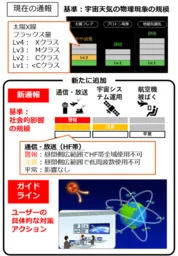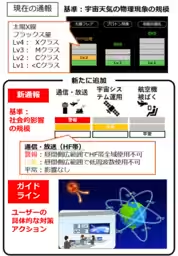

New Guide and Alert System for Space Weather Events to Enhance Public Safety
New Developments in Space Weather Alerts
The National Institute of Information and Communications Technology (NICT), led by President Hideyuki Tokuda, recently announced the launch of a new alert system known as SAFIR (Space weather Alert For social Impacts and Risks). This initiative follows discussions from the 2022 Ministry of Internal Affairs and Communications' committee on enhancing space weather forecasting. Effective from June 19, 2025, SAFIR will be pivotal for bettering responses to space weather phenomena that could disrupt critical infrastructures such as communication, broadcasting, space system operations, and air travel.
Purpose of SAFIR
SAFIR aims to provide timely notifications based on the social impacts of space weather phenomena, transitioning from a model focused on the size of natural events to one that emphasizes their societal consequences. This innovative approach will detail how different industries, such as telecommunications and utilities, may experience varying effects from these events.
The system includes two primary components:
1. Space Weather Event Notifications: These alerts will categorize events according to their potential impact on specific infrastructures, articulated in user-friendly terminology that avoids technical jargon. This is designed to enhance understanding among infrastructure operators, ensuring they can respond adequately to potential threats.
2. Space Weather Information Utilization Guidelines: Crucial for disaster prevention and mitigation, these guidelines provide practical actions for industries to take in response to these events. They summarize the distinct effects and countermeasures pertinent to the telecommunications, aerospace, and energy sectors, ultimately guiding operators in establishing effective Business Continuity Plans (BCPs).
Background Context
Space weather, which is influenced by solar phenomena such as solar flares, can significantly disturb Earth's near-space environment. These disturbances might affect essential services, leading to potential fallout for industries including communication, satellite navigation, and electricity supply. Given that variations in space weather can have different implications across sectors, a unified approach to its forecast and interpretation became paramount.
Historically, NICT has been providing space weather forecasts since 1988, distributing updates via websites and emails. However, there has been a lack of clarity regarding how these forecasts correlate with the societal impacts they propose to mitigate. Discussions in the 2022 committee highlighted the need for more precise alert frameworks that consider different risks to social infrastructures.
Recent Outcomes
As part of its commitment to addressing these challenges, NICT's recent publications include:
1. SAFIR Notifications: These alerts, based on societal impacts rather than mere natural event scales, are comprehensive yet approachable for practitioners in various sectors.
2. Utilization Guidelines: These present practical applications of space weather forecasts, outlining how relevant stakeholders can use the information to minimize risks effectively.
3. Introduction Handbook: Designed for newcomers to space weather, this guide provides fundamental insights into space weather phenomena and their potential impacts.
These resources are accessible through the NICT’s dedicated website here.
Future Outlook
With the implementation of SAFIR and the accompanying guidelines, it's anticipated that both private and governmental entities will have the tools necessary to better comprehend space weather events and formulate appropriate response strategies. Continuous communication with stakeholders and updates to the information provided will be essential in ensuring the system's effectiveness. Future expansions of SAFIR will aim to include performance standards for additional sectors such as geolocation, thus broadening its applicability.
This progressive step towards integrating space weather information into everyday operations is essential for cultivating a more secure and resilient society, ultimately facilitating resource development and enhancing public safety in the face of potential space weather disruptions.
Reference Information
The committee on enhancing space weather forecasting, led by the Ministry of Internal Affairs and Communications, provided crucial recommendations that culminated in the creation of SAFIR and the associated guidelines, ensuring a national-level response to mitigate potential risks posed by extreme space weather events.

Topics Other)










【About Using Articles】
You can freely use the title and article content by linking to the page where the article is posted.
※ Images cannot be used.
【About Links】
Links are free to use.